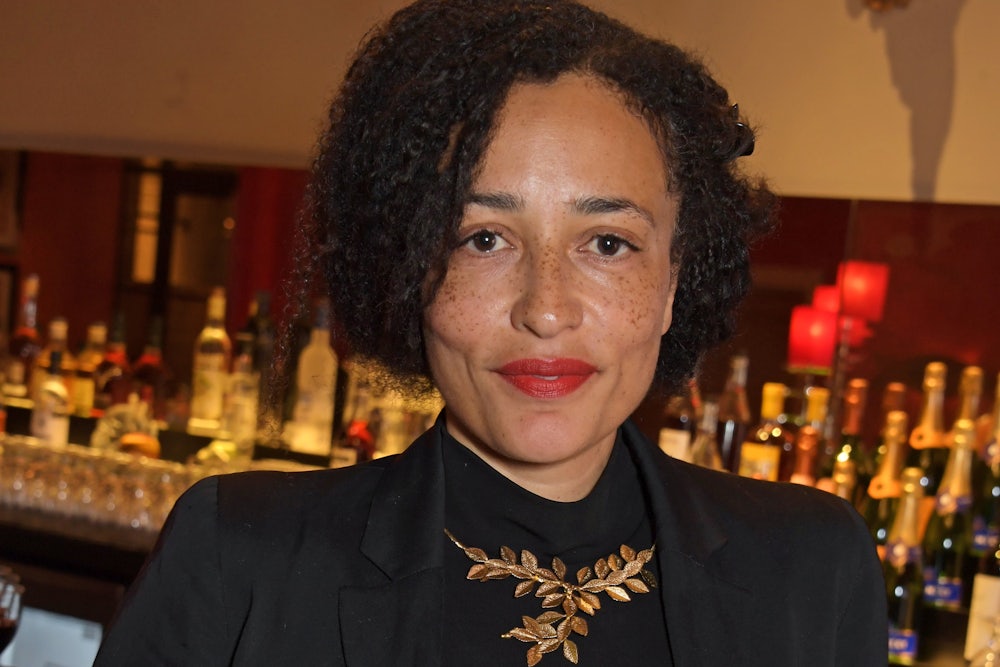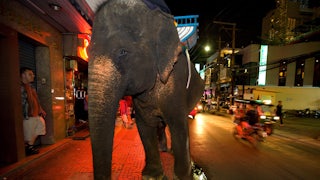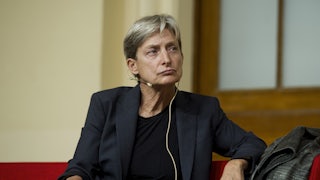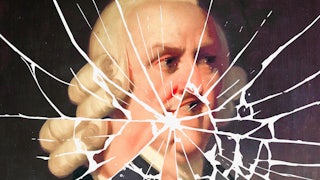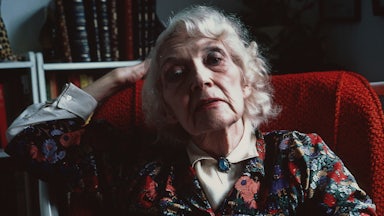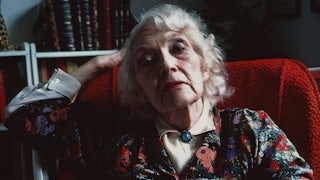Zadie Smith’s take on the Wife of Bath opens at a pub in the London borough of Brent. People have gathered to tell stories drawn from their lives, just as Geoffrey Chaucer’s late-fourteenth-century pilgrims do en route to Canterbury. Enter Alvita, the Wife of Willesden. She is Smith’s reimagining of Alison, the Wife of Bath, and as sharp, spirited, and unapologetic as ever.
In Smith’s Wife of Willesden—which premiered at London’s Kiln Theatre in 2021, opens at the American Repertory Theater in Cambridge, Massachusetts, on March 2, and heads to New York’s Brooklyn Academy of Music in April—a chorus of voices at the pub chime in as Alvita dishes on men and women, power and deception, sex and desire. “We want to travel, to live, to seek / Fresh pastures, possibilities, new worlds,” Alvita says. “We’re women. Not children. Not little girls.” Smith and I corresponded by email about her first encounter with Chaucer, her early influences, and the importance of getting out of the way of one’s characters.
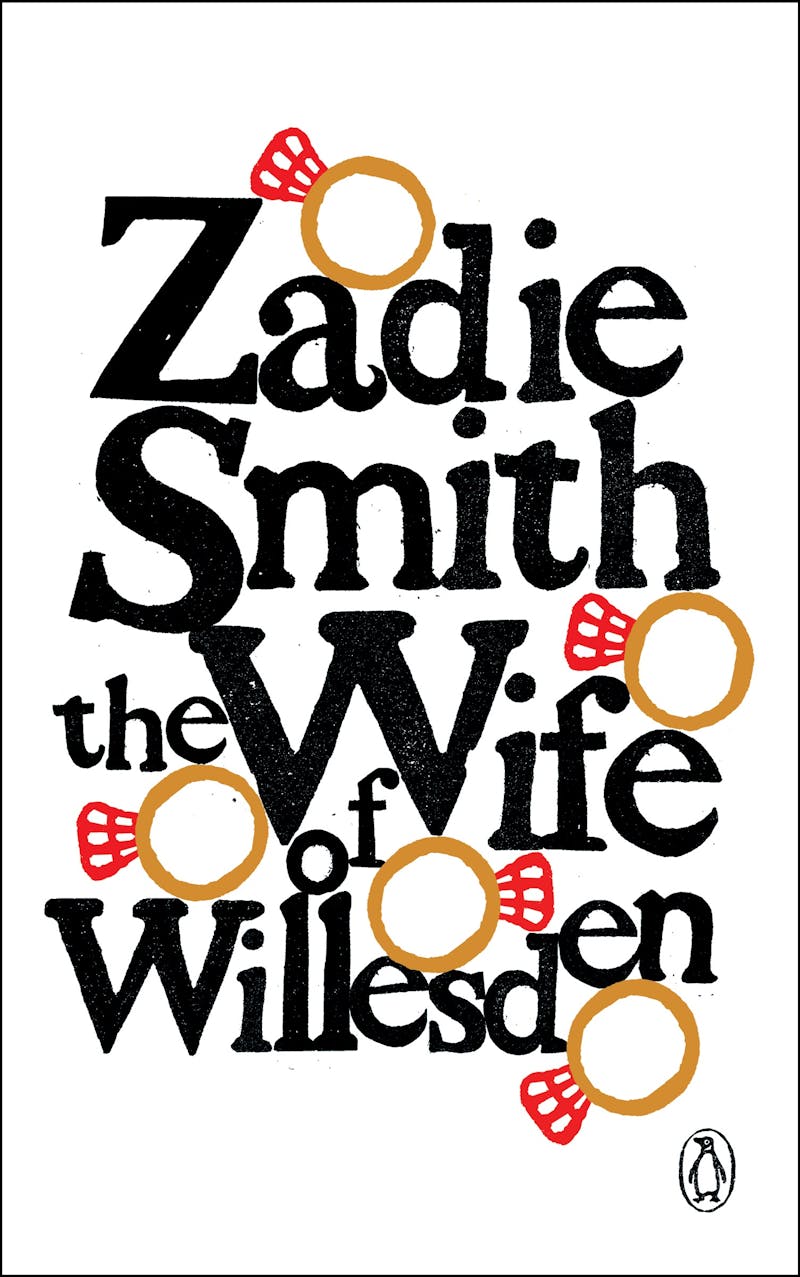
Melissa Rodman: Your new play reworks the story of the Wife of Bath. I’d love to hear about the first time you read Chaucer’s Canterbury Tales. What were your first impressions of the Wife of Bath?
Zadie Smith: I first read it in school. I’m in awe of how those teachers took such distant texts and found ways to get them across to a bunch of rowdy state school kids. It’s relatively easy to teach literature to a load of freshmen at, say, Harvard. Everyone’s more or less on the same page: Even their ideological debates are really just flip sides of a single, elite discourse. In an inner-city secondary school there’s such a broad spectrum of academic abilities, social classes, cultural backgrounds, mother tongues, etc. You really have to get pretty creative with your teaching just to hold the attention of the class.… Anyway, it’s my memory that the text was not censored as it usually is in British classrooms, so as the teacher read it aloud, the poor woman was frantically trying to redact sections in real time, skipping over the bits where Alison boasts about her amazing vagina, for example, or insists on having an orgasm before her husband. Naturally, this only encouraged us. You became very committed to sniffing out and translating precisely those bits. “Is she really talking about her punani, Miss?” That sort of thing. Very enjoyable.
M.R.: As a novelist and critic, what made you realize that your reimagining of Chaucer should be a play?
Z.S.: It really wasn’t the plan. I was trying to write a little monologue. But she mentions so many other people and tells so many stories, I felt you needed to see them animated. I also found that bringing other people to the stage usefully modified that lazy and banal conceptualization of the Wife of Bath as “a woman finally getting the space to tell her story.” As if all medieval women were silent, or—more to the point—as if all women’s narratives are uplifting tales of personal discovery. Alison certainly gets to tell her own story, and it is often uplifting—but it’s also full of exaggeration, self-deception, outright lies, dubious opinions, triumphalism, and unfounded assertion. She’s a human being, in other words.
M.R.: The Wife of Bath famously is an outspoken character. What ideas could she, as a taboo-breaker, voice for you that another character couldn’t?
Z.S.: Even when I’m writing my own characters, I am very rarely voicing things “for me.” But in this case, I never was. I really can’t overstate how much this is a work of direct translation. The only exception is in the “General Prologue” part, where I had to pick and choose for reasons of length. But the Prologue and Tale are direct transpositions. Anyone who knows the text well will see that. My only task, as far as I was concerned, was to find contemporary language and convincing rhymes for Chaucer’s verse. The staged version differs from this principle a little because there were things the actors found they couldn’t work with, lines that didn’t land—also it was running too long. But in the book version it’s pretty much line for line. For the record, I have to say I don’t find her so very outspoken. The women I grew up around spoke about sex pretty much in Alison’s way, quite openly, and had a similar tendency towards self-mythology …
M.R.: Critics often will try to identify writers’ influences; you’ve been compared to Charles Dickens, Thomas Pynchon, and Don DeLillo. How did you feel about going back centuries for inspiration, taking Chaucer’s poem and running with it?
Z.S.: Personally, I think a writer’s most profound influences come from their childhood reading. In my case you’d be better off with the Jamaican Y.A. writer Andrew Salkey, C.S. Lewis, Roald Dahl, Judy Blume, and Mildred D. Taylor—plus Erica Jong and James Baldwin, both of whom I nicked off my mum’s shelves, at an inappropriately young age.
As for centuries back, well, I have never really gotten over the fact that you can write down some sentences 2,000 or 600 years ago and I can read them today. That may sound very stupid, but I find it mind-boggling. Can’t meet dead people, can’t speak with them, can’t usually wear their clothes or see the places they lived. But I can run their words through my brain at any moment, as if they were sitting right beside me. We can meet in my mind. We don’t have to necessarily agree on everything, but we can still meet. That’s miraculous to me. I can meet Phyllis Wheatley? Plato? Malcom X? St Augustine? Chaucer?? In what other form is it possible?
Perhaps this attitude comes from a childhood spent in libraries. I did not usually know much about the authors of the books I borrowed and I certainly had a very hazy idea of when they were written. I was only really interested in whether, when I opened a book, I could hear a human being speaking to me. Of course, with bad writing, you don’t hear anything. It’s just cliché and generalization—it has no pulse. But with someone like Chaucer there’s just so much life. I really don’t feel centuries away from him. He’s interested in ordinary, working people. He’s interested in human folly and vanity. He’s interested in sex and ethics and women. I’m interested in all those things, too.
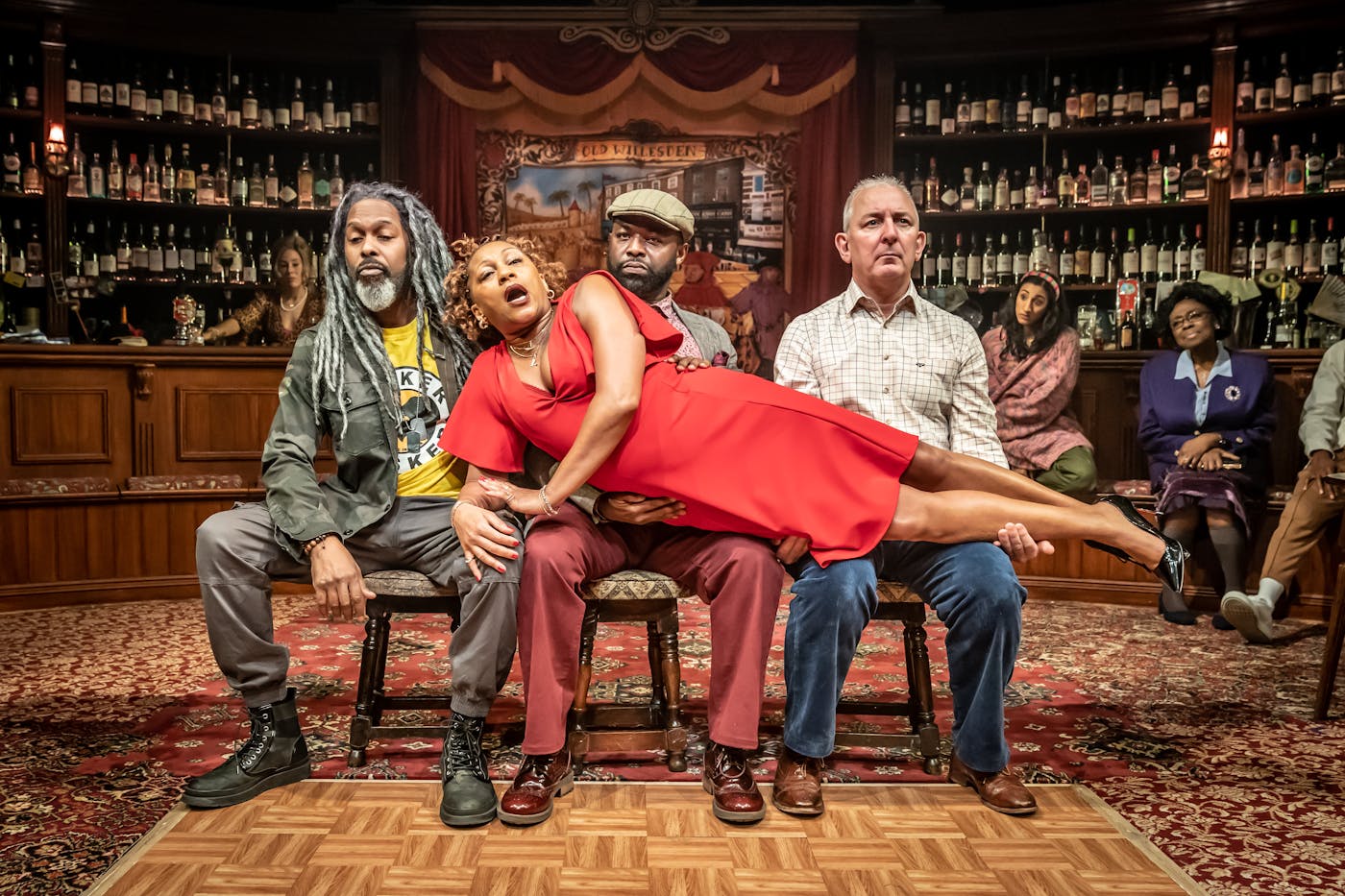
M.R.: Pilgrimages are tied to destinations; Chaucer’s pilgrims are journeying from Southwark to Canterbury. Your setup, “The General Lock-In,” a local pub crawl along the Kilburn High Road, is a shorter trek. In fact, Alvita’s story unfolds in one pub, the Colin Campbell. What makes a pub such a good destination?
Z.S.: Well, that’s another one that Chaucer could answer just as well as me, and which shrinks the 600 years between us. Then, as now, an “inn”—as he would have called them—is a place for people to gather, especially working people. A place to talk, drink, and let loose a little. They have also, historically, been places of community discussion, political agitation, radical gatherings—you name it. Up to the middle of the twentieth century, many British pubs kept a meeting room upstairs where a sort of working-class lecture circuit was hosted. Certain pubs have a long history of radical activity. It wasn’t all just dart throwing and pub quizzing and football hooligans. Of course, pubs are disappearing from Britain like so many of our communal spaces, but in my play—out of pure nostalgia—I have resurrected the idea of the pub as focus point, where a local community gathers to exchange ideas, some of them ridiculous, some of them radical.
M.R.: You’re from Willesden, and that part of London has featured in your work since White Teeth. What keeps you returning to this place and finding something new there?
Z.S.: You don’t know the half of it. I just finished a novel set 200 years ago, which is also mostly set in Willesden (when it isn’t in Jamaica). Willesden is just an uncommonly interesting place. When I was young, I used to think it was because it was so various. Schools in which a hundred languages are spoken. Churches becoming synagogues and then mosques. War refugees coming in waves over decades from Poland, Germany, Bosnia, Somalia, Iraq, Syria, Sudan, Ukraine.… Where else could you see that global twentieth- and twenty-first-century history played out in a few streets? Queens, New York, maybe. But I had the good luck to be born in Willesden. And I do still find the place fascinating, though now that I’ve gone back 200 years, I have to admit that the excitement of Willesden far predates my own time period. The sunsets have always been beautiful. The people have always been uncommonly interesting. And varied. Maybe there’s something in the water.
M.R.: Toward the beginning of the pandemic in 2020, you published an essay collection reflecting on life during that time. What was it like working on The Wife of Willesden around that time too, when performance simply wasn’t happening, and we didn’t know when or how theaters would reopen?
Z.S.: Surreal. Melancholy. But there was also something very inspiring about it. We had no sense of what lay at the other end. So for once I wasn’t subject to the old dread that all art-making—including my own—is really just a pathetic desire to get some form of attention not received in childhood.… To be clear: I don’t feel that when I’m working. But I’m always afflicted by it at the moment of publication. What I loved about working on the play with the cast and Indhu [Rubasingham], the director, was the bracketed sense of not knowing if it would ever see the light of day. I remember Indhu telling me about how all the backstage people—the set designer and sound designer and costume designer and so on—met on Zoom week after week to puzzle out how to put it on, if it went on. That’s the best and purest part of art-making for me: solving the puzzle. And I was so moved by the idea of people doing that in a vacuum, on Zoom. And then when we all finally got into the rehearsal room, I’ll never forget those 10 actors making it out of nothing, often with masks on, often with terrible, painful, pandemic-related things going on in their personal lives. I watched so many old musicals as a kid that revolved around that principle “the show must go on.” It was very gratifying to find out in middle age that that’s a real principle and Show People really live by it. Show People are incredible.
M.R.: In your introduction to the play, you write, “I think when we talk about ‘creativity,’ not enough is said about the interesting role that limits, rules and restrictions can play.” What kinds of rules do you set for yourself when you’re writing?
Z.S.: Get out of the way. That’s number one. It’s a general principle with a few different applications in my mind. A character can’t do something, for example, because it makes me feel better about myself, or makes my own “life choices” look better to me, or to you or whatever. Or: Language should be used in the service of what I’m doing, not to demonstrate something about my use of language. I have to get out of the way, and let the story or essay or whatever it is go where it goes.
All other rules are more prosaic. Don’t use more words than you need. Don’t pile abstraction upon abstraction. Almost no need for similes or metaphors. If a sentence sounds ridiculous, essentialist, or hopelessly generalized when definitively applied to the big, wide world of white people, then the same language reversed is very likely equally reductive when applied to the big, wide world of Black people. Avoid too many semicolons and italics, etc. Don’t just reproduce the language of journalism or of the algorithm and think your job is done. That’s about it. Nothing fancy. It’s stuff you pick up over the years. Which reminds me: A wonderful ex-student of mine gave me a postcard with a Geoffrey Chaucer quote on it: The life so short, the craft so long to learn. That’s how I feel. I’m over halfway through my life and there’s still so much to learn.
